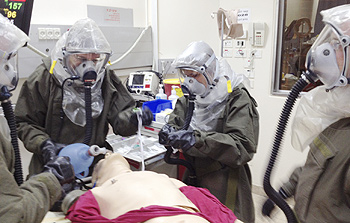UPDATES
Israel – a leader in disaster planning
January 9, 2012 | Sharyn Mittelman

Israel has assumed the unwanted role as a world leader in developing medical technology and planning to prepare for disasters, and its innovations are being studied and disseminated to other countries to save lives.
In one example, American politician Gabrielle Gffords was shot in the head and almost killed a year ago, but an Israeli-made bandage is credited with stopping her bleeding. Today she is alive and on the road to recovery.
Dr. John Cohn, a Professor of medicine and assistant professor of pediatrics at Thomas Jefferson University, recently wrote about his visit to Israeli medical centres to learn about their medical disaster management plans on a program now in its eighth year run by the Disaster Management Division of Israel’s Ministry of Health.
In his article “In the Field With Israelis Prepping for Disaster” (November, 30), Dr. Cohn highlighted some of Israel’s leading innovations in disaster management, and the dramatic extent to which Israeli medicine has had to prepare for some anticipated military worst case scenarios in the near future. The article is also notable for pointing out the realities of the Israeli medical system – where Jews and Arabs both are treated together and work together without fear of favour – effectively repudiating the falsehood being spread about Israel as some sort of ‘Apartheid state’:
“During our visit last month, we met with physicians, nurses and psychologists. We saw hospitals prepared to move underground if Hezbollah fires some of the 50,000 rockets they have stockpiled in southern Lebanon.
Lebanon is close enough to see from the repaired windows of the ophthalmology wing at the Western Galilee Medical Center in Nahariya. During Israel’s 2006 war with Lebanon, the ward’s patients had been evacuated to the hospital’s basement care complex when a Hezbollah missile crashed through those windows and exploded.
In Israel, where there are no designated military hospitals, facilities treat not just Jews and Arabs but wounded soldiers and terrorists alike. As rockets fell, Israeli Jews and Arabs worked side by side in the same hospital.
And as terrorists targeted restaurants and buses filled with children, the hospital added a day care center to its sheltered space, so personnel would know their children were safe when they were at work.
In more peaceful times, Lebanese women would cross into Israel in order to give birth to their babies in Western Galilee’s delivery rooms. Although the United Nations has failed to impede Hezbollah’s massive Lebanese rearming and fortification construction, U.N. troops have halted the soon-to-be moms. That traffic has largely stopped.
At Rambam Medical Center in Haifa, we saw the construction of a three-story underground garage, designed to be a secure healthcare complex. This parking garage includes oxygen lines and water for decontamination. All Israeli hospitals have such capability, in the event that chemical weapons are used. In the Rambam emergency department, emergency supplies are stockpiled on identical carts, ready to be wheeled into action.
Opposite Gaza, in Sederot, where as many as 60 Kassam rockets a day fell on that community, every home has a bomb shelter designed to protect family members from flying shrapnel.
Sederot and the surrounding area has become a laboratory to learn how to treat post-traumatic stress disorder. The problem, as we heard, is that there is no “post.” The rockets still fall.
Everywhere, Israeli doctors and nurses are practicing and preparing. We spent time with the trauma surgeons who commanded the field hospital Israel sent to Haiti after its 2010 earthquake. Their expertise allowed them to be the first on the ground after the quake.
Still, there was no doubt these professionals prefer using their skills treating the victims of accidents and natural disasters rather than those of war. IDF medical corps members take a pledge to treat the wounded or sick, “friend of foe,” never leaving the wounded in the field.
At times, we learned that this can be an extra challenge, as when medical personnel were lowered onto the Mavi Marmara, the Turkish ship, after extremists attacked Israeli troops enforcing a weapons embargo of Gaza. The militants pulled out wounded passengers’ chest tubes and otherwise interfered as Israeli medical personnel treated the injured on both sides.
It could be argued that optimists in Israel believe a peaceful accommodation will be made with Israel’s Arab enemies while pessimists do not. No Israeli we met would dispute that the search for a secure peace is paramount. Israelis may differ on how to get there, but not on the desire.
But, in preparing for mass casualty events, Israel’s health care optimists might better be defined as those working to be sure they will be ready for whatever comes next.”
By the way, here’s another interesting little story about what a unique and interesting place Israel is. Apparently, some of Tel Aviv’s most popular bars are doing a roaring business by inviting lecturers from Israel’s world-class Weizmann Institute of Science to come give talks to their patrons. This is one of those stories that deserves the label ‘Only in Israel’.
Sharyn Mittelman
Tags: Israel





